Apollo 11: When men walked on the moon
This year marked the 50th anniversary of the Apollo 11 moon landing, when men first walked on the moon. You might have heard about it - it got far more attention than the anniversary of Apollo 8 orbiting the moon on Christmas Eve.
The anniversary was actually back in July, and at the time I attended various anniversary events and started writing, but somehow couldn’t figure out exactly what I wanted to say. Now it’s the end of the year, and, ready or not, here I come!
A great achievement
At the time of the anniversary, people were talking about the landing as “man’s greatest achievement” or “the event of the twentieth century”. And I think it’s hard to think of any greater exploration achievement. At the start of the twentieth century, humanity had just barely started to leave the ground. Apollo 11 was the first time any human had set foot on a different world.
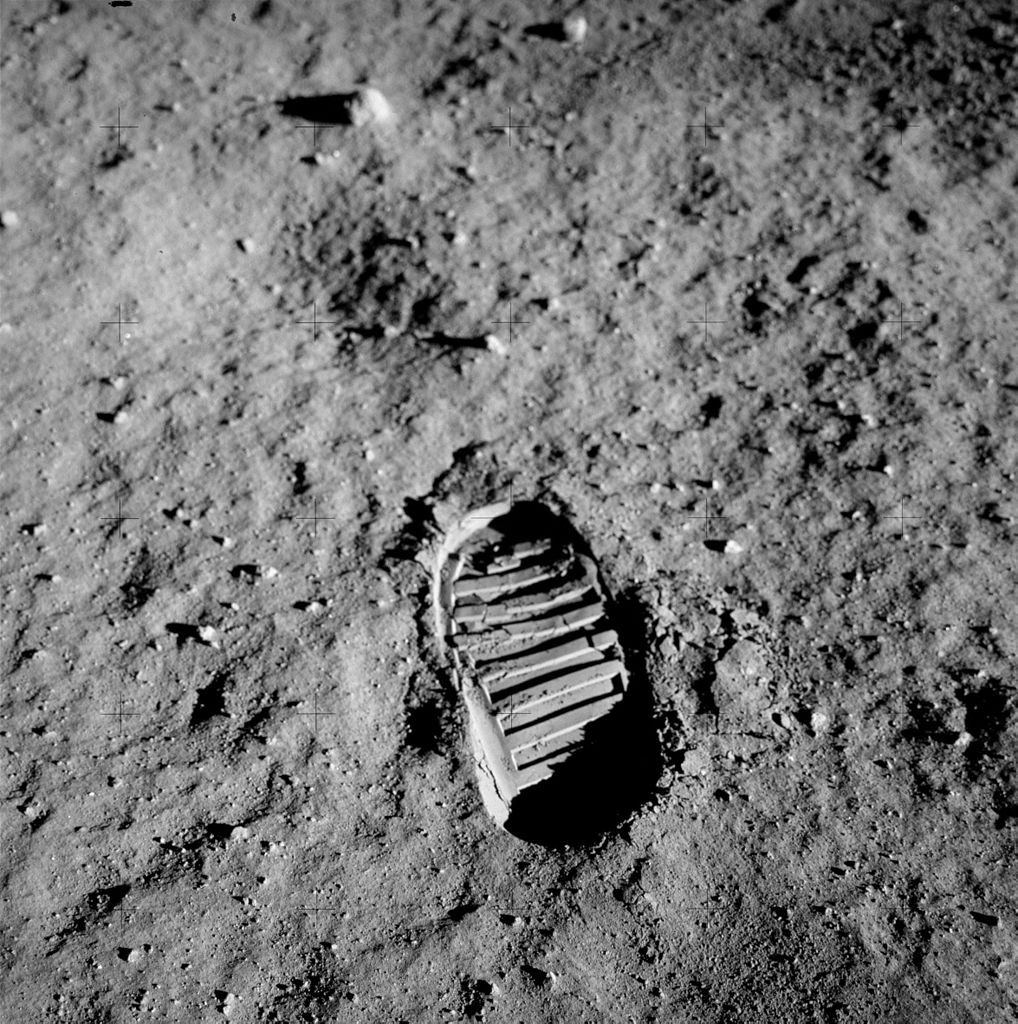
What’s more, it wasn’t just any world. As I discussed when writing about planting a flag on the moon, the moon is an important part of our night sky, and one which can be seen all over the world (it’s a rather nice-looking crescent moon tonight). The moon is outside national control, and truly belongs to everyone.
It controls our tides. It has defined months and seasons. It has been an important part of myths and legends (the man in the moon gets mentioned a lot!). Its eclipses are beautiful, and have even given rise to fantastical prophecies.
Humans have long dreamed of going there. This year, I re-read stories of moon-shots from Jules Verne, H.G. Wells, Hergé (Tintin), and Heinlein, and they certainly weren’t the only ones to write about it. Apollo 11 was the space-ship that achieved this dream, in the process showing it far more complicated than previous writers had expected.
One final thing that the moon landing gave us was a better understanding of our Earth. It turns out the moon isn’t just a near neighbour: It originally split from us. Truly it is an important part of our story, and it was a rare privilege that humans were able to walk on it.
If our exploring spirit continues we may visit places that are further away, or places that are more inhospitable. I don’t think we will ever visit another place outside of Earth that is so much part of us.
A swift achievement
One of the things that amazes me most about the moon landing is how quickly it happened.
The first powered flight was in 1903. Apollo 11 was 66 years later.
The first satellite orbiting the Earth, Sputnik, was launched in 1957. Apollo 11 was 12 years later.
The first man to orbit Earth, Yuri Gagarin, did it in 1961. Apollo 11 was only 8 years later.
The first men to orbit the moon did it in Apollo 8 in December 1968. Apollo 11 was only 7 months and 3 missions later.
Of course, much of this was due to the Cold War. President Kennedy had set the end of the decade as a target to put men on the moon. The space race had become part of a larger fight for technological superiority with the Soviet Union.
It wasn’t meant to be easy. The Soviet space program had managed to beat NASA to many firsts, and targeting the moon was meant to be sufficiently hard that they would have to start from scratch.
NASA and its contractors had to do things that had never been done before. They drove the development of whole new industries, including that of integrated circuits. The computers aboard Apollo 11 may seem primitive today, but at the time there was nothing like them anywhere else.
At its peak, the space program took nearly 5% of the national budget, and around 400,000 people were involved in it. The deadline may have seemed arbitrary, but it drove a lot of their decision making. They did not want to be upstaged by the Soviet Union again.
To achieve that deadline, they took shortcuts, some of them dangerous ones. But the fact that they succeeded is a testament to the hard work and dedication of everyone involved.
Bringing humanity together
One more thing that it did was to bring humanity together, just as the moon itself does. It’s said that up to 600 million people around the world watched Neil Armstrong’s first step (15 - 20% of the then world population). It defined an era: I’ve heard many people talking about where they were when they watched it, including my parents watching it in school. It wasn’t just a giant step for the United States, but for humanity.
It was an exciting time. There were parties everywhere. In fact, when the astronauts returned Buzz Aldrin thought they’d missed the excitement. They’d been on the moon, but the real action had been here on Earth.
A new era of exploration
In our modern, ultra-connected era I don’t think we recognise quite how historically unusual this is. In past eras, explorers went out, discovered whatever they discovered, and then came back. It might take months or years, and if they were lost all their discoveries were lost with them. And then when they came back if their stories were too unusual they might not be believed (I mean, black swans and duck-billed platypuses? You expect us to believe them?)
The moon was far further than any previous explorers had gone, and yet millions were able to watch it in almost real time. Not just the landing either - the entire mission from takeoff to splashdown was little over a week, and the general public had been able to see most of the key moments.
Also, unlike previous explorers, if things had gone wrong, they wouldn’t have been alone. Dedicated teams back on Earth would have been working round the clock trying to figure out solutions.
Neil Armstrong pointed this out in his fortieth anniversary letter to Australian technicians:
The [science fiction] authors foresaw my part of the adventure, but your part was beyond their comprehension.
Australia’s role
Growing up, I knew about the moon landing. I’d heard about the “giant leap for all mankind”. But it felt like past history, and American history at that.
The time I was most interested in space was when I spent a few months in Denver as a child. Back then, it really felt that “NASA” and “Space” were basically synonymous. And my interest waned quickly, perhaps because I read too much (I remember feeling bored with space before returning from Denver). However, I also suspect that, once I got back to Australia, it just felt less relevant, because space was an American project.
What I never realised was how much of a role Australia had played, both in Apollo 11 specifically and in the US space program generally. A few years back, I visited Canberra, our capital, for the first time. And, while I appreciated seeing our Parliament and the workings of our government, my favourite place was the nearby Deep Space Communication Complex (“Managed in Australia on NASA’s behalf by CSIRO”). It had a display about the space program, and I saw the first moon rock I’d ever seen - but, more importantly to me, it showed how we had been involved.
NASA had needed a network of radio-telescope stations around the world to maintain constant communication with Apollo 11, and Australia formed an important part of that. They still do today:
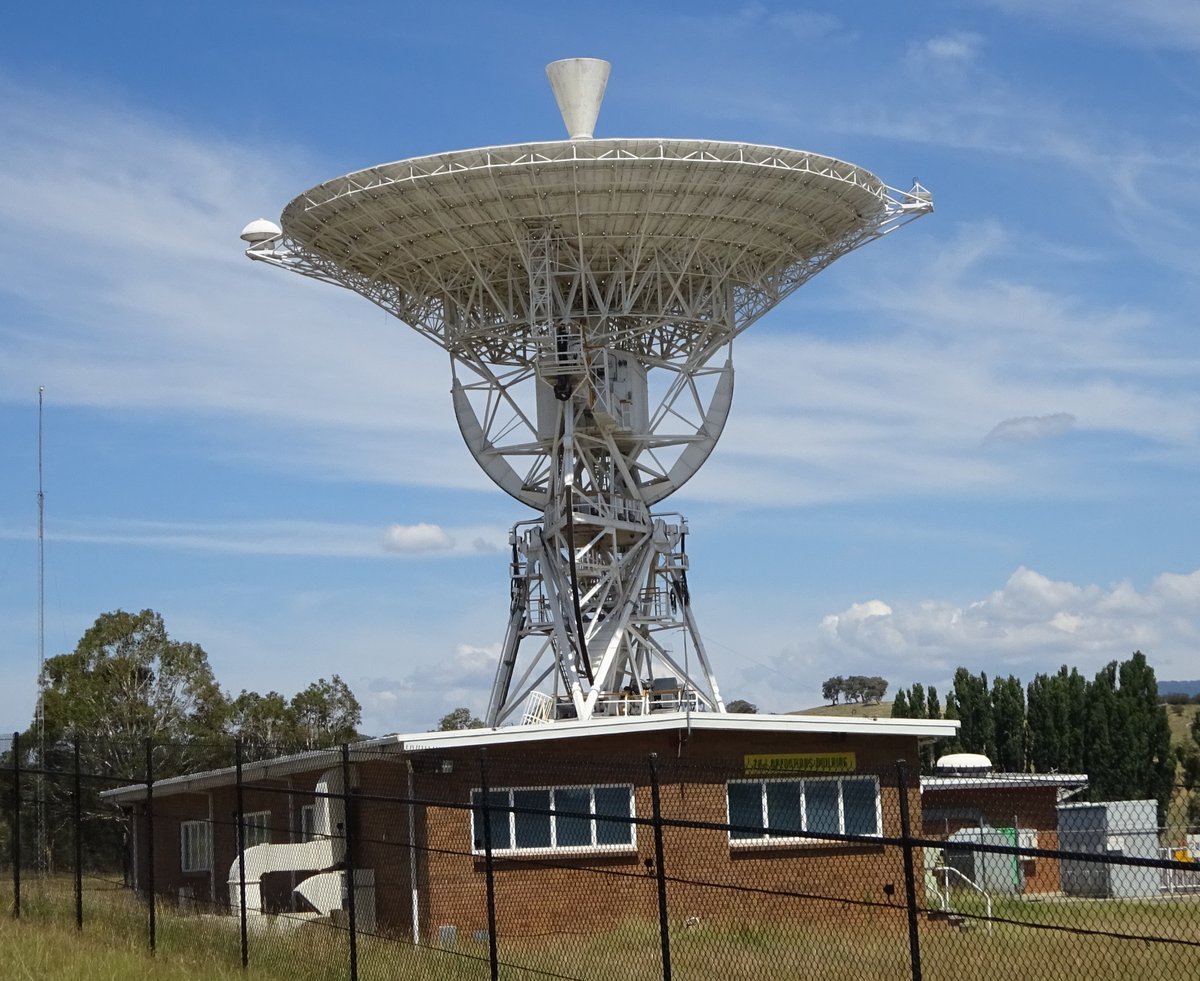
When Michael Collins visited Australia as part of the post-Apollo 11 world tour, he said:
I don’t feel like any stranger here, although it’s the first trip to Australia both for me and for my wife Pat.
When we talked to the Earth from the Moon, a good share of the time it was to Australia and we criss-crossed back and forth across your country for more than a number of times.
It had a particularly important role in broadcasting that first moon landing. For technical reasons, video footage from the moon was upside down, and receiving stations needed to change a switch to flip it. The Australian station at Honeysuckle did this, while the American station at Goldstone didn’t.
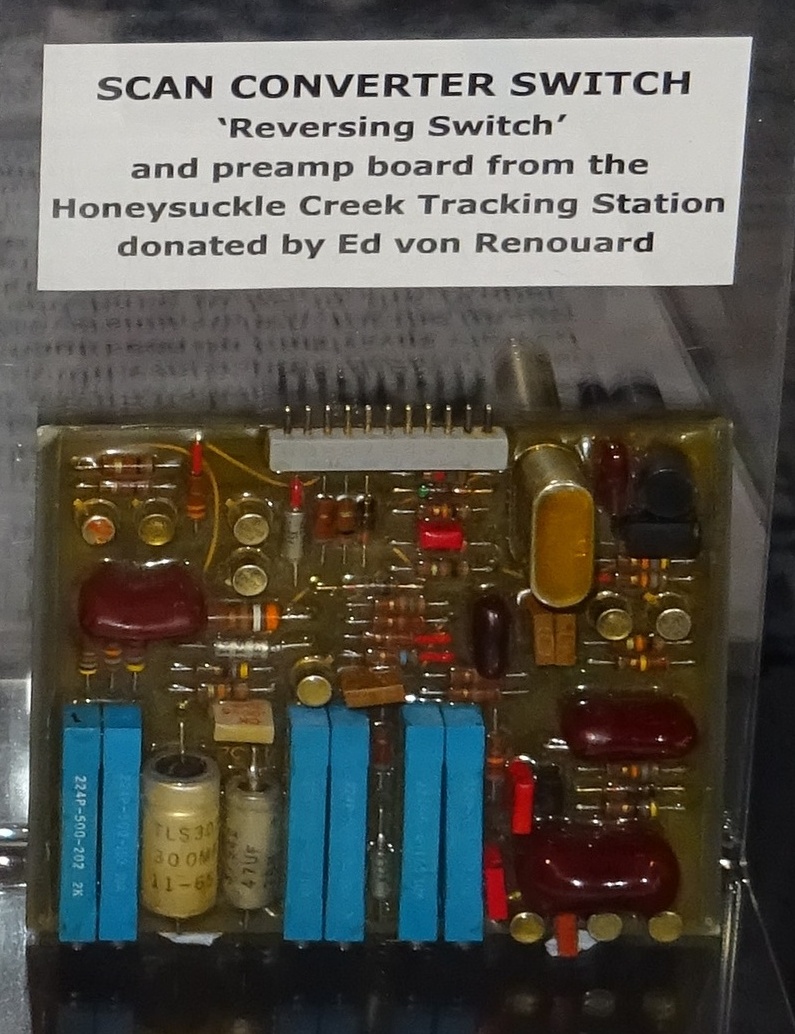
Basically, the most iconic footage of the moon landing was first received by an Australian radio-telescope. Which also means that, technically, I think Australian audiences saw the footage about 3/10 second before anywhere else in the world.
As part of their mission of coming “for all mankind”, the Apollo 11 crew brought messages of good will from the leaders of 73 different countries. And I whole-heartedly agree with the message from Australian Prime Minister John Gorton:
Australians are pleased and proud to have played a part in helping to make it possible for the first man from earth to land on the moon. This is a dramatic fulfillment of man’s urge to go ‘always a little further’; to explore and know the formerly unknown; to strive, to seek, to find, and not to yield. May the high courage and the technical genius which made this achievement possible be so used in the future that mankind will live in a universe in which peace, self expression, and the chance of dangerous adventure are available to all.
This year, Australia had two commemorative coins for the 50th anniversary. One was a 5c coin with a boot-print on the moon - remembering the amazing achievement of putting men on the moon (it’s actually our first ever commemorative 5c coin). The other was a $1 coin showing the radio-telescope and the men working in the Honeysuckle station in Australia, making sure the world could share that achievement.
Part of my enduring memory of visiting that centre is of massive dishes working in otherwise remote and seemingly untouched Australian bushland:
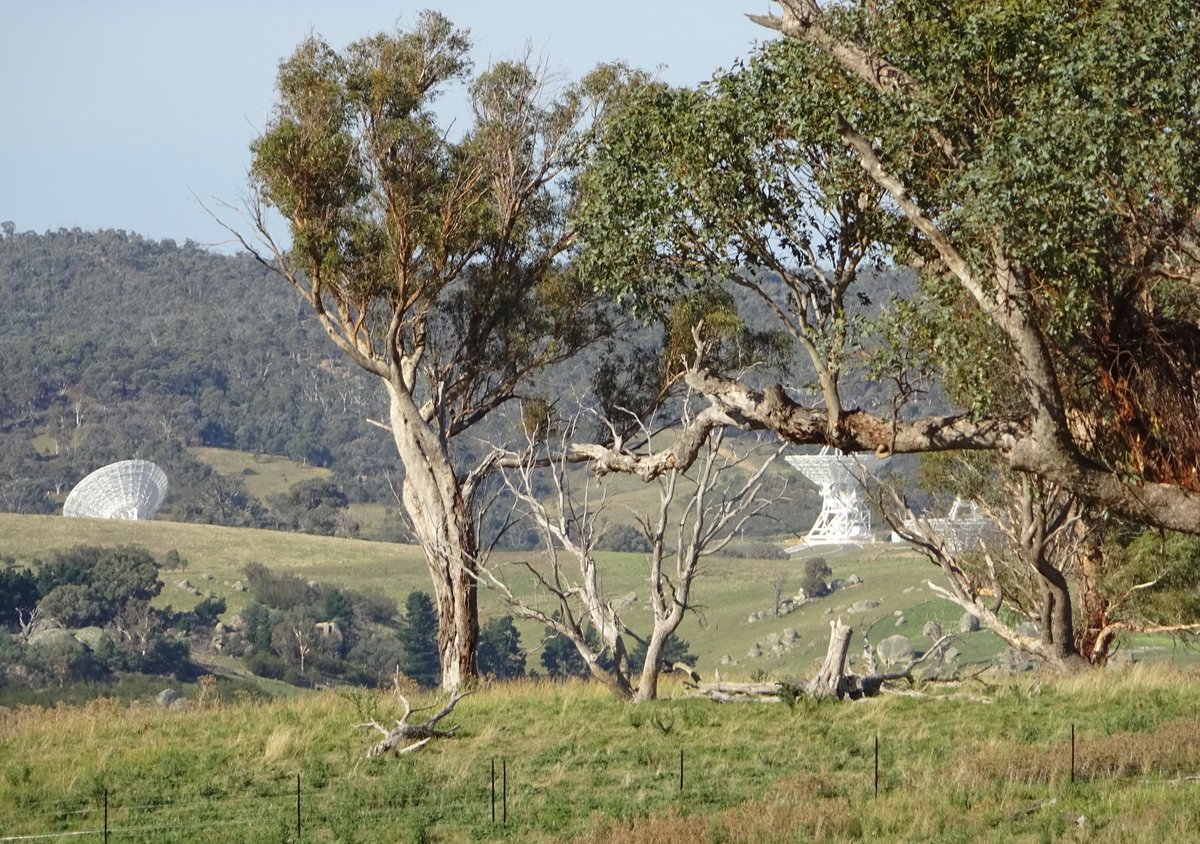
It seemed so incongruous, but at the same time so right. I love the wilder parts of my country, but I also like feeling that we have something to contribute to the world. I was glad that my country had played an important role in one of the greatest achievements of the twentieth century, and was continuing to support the exploration of space, humanity’s final frontier. And it was perhaps that visit that sparked in me a new interest in space, which, unlike in my childhood, did not die out in a few months.
I mentioned that I attended various Apollo 11 commemorative events: One of them, at Scienceworks, aimed not just to remember the achievement, but to talk about what we could learn and the way forward for Australia in space. The Australian Space Agency was founded last year, and its head was one of the panellists. She talked about the importance of partnerships: We know we’re not big enough to go it alone, but we also know that we have a lot to offer, in both location and in technology. The panelists held out the hope for an “Aussie-naut” to go into space and maybe even walk on the moon, but recognised it would be a lengthy process.
In peace for all mankind
I’ve already written about this in my flag post, but I just love the Apollo 11 mission patch, because, coming with the olive branch of peace, it says so much of what was good about the mission:
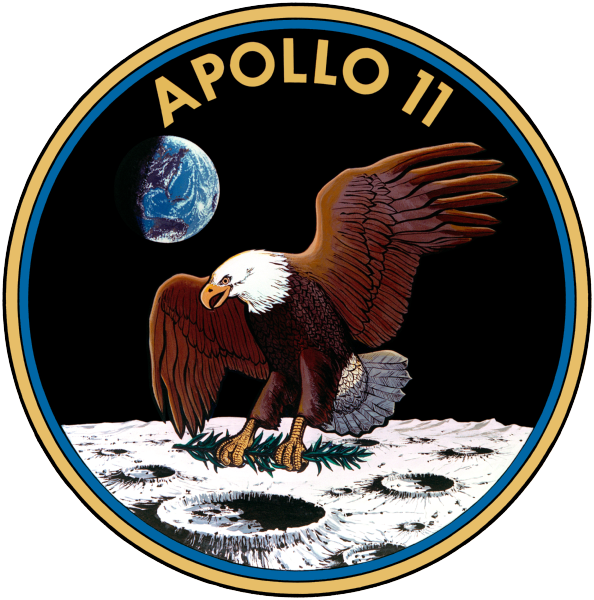
The Apollo project may have been driven by the Cold War, but I really hope the moon can be a place where as humans we can heal our divisions and share the wonder of the universe, because it really is wonderful. The universe doesn’t need us humans, but we do need it, and we also need each other.
After the first footstep
Just by arriving, Apollo 11 had completed its most important mission. Unlike later missions, the astronauts did not have to go far: A crater 200 feet away was the furthest they went from the lander. There were still plenty of things to do, of course: Collecting moon rocks, setting up scientific experiments, talking to the president, raising the flag, leaving memorials, and just trying to figure out what walking in moon gravity was like. But it was not a lengthy mission.
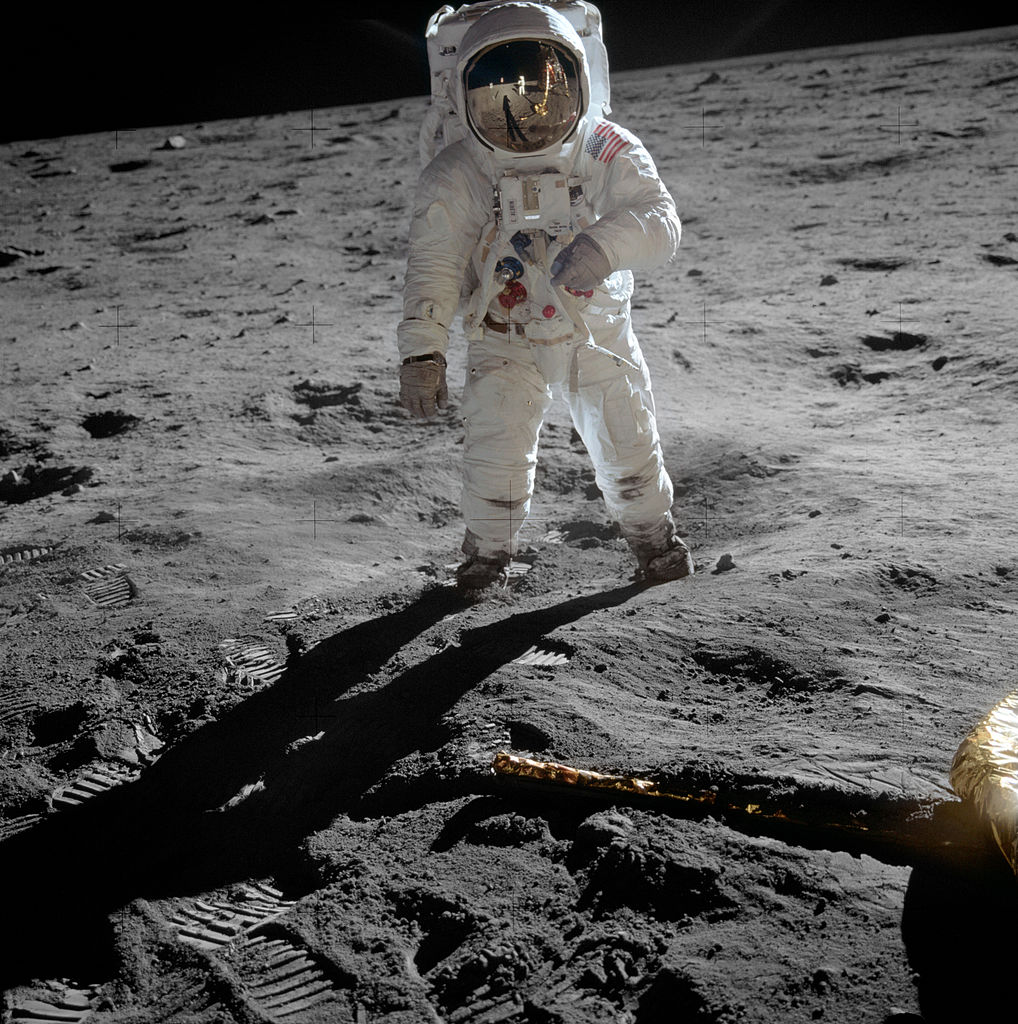
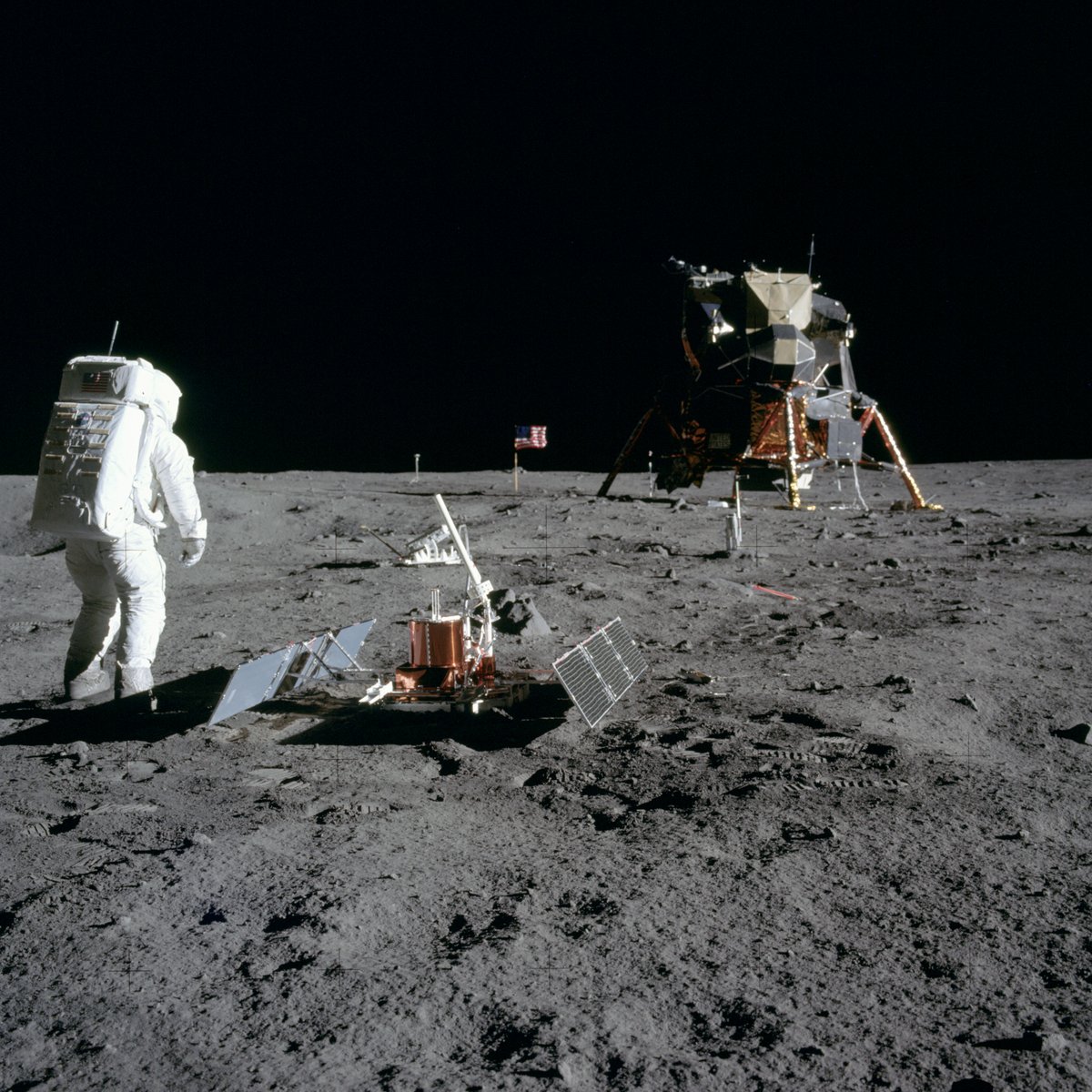
The return to Earth
All too soon, the time came to return. For a while, Michael Collins orbiting the moon had been about the loneliest any human had ever been: Every time he went behind the moon, he completely lost contact with Earth.
However, that hadn’t bothered him: His secret fear had been that the lunar ascent module would fail, leaving Neil and Buzz stranded on the surface of the moon. If so, there would have been absolutely nothing he could do about it. Fortunately, the ascent and docking worked well, and even provided the opportunity for a photo:
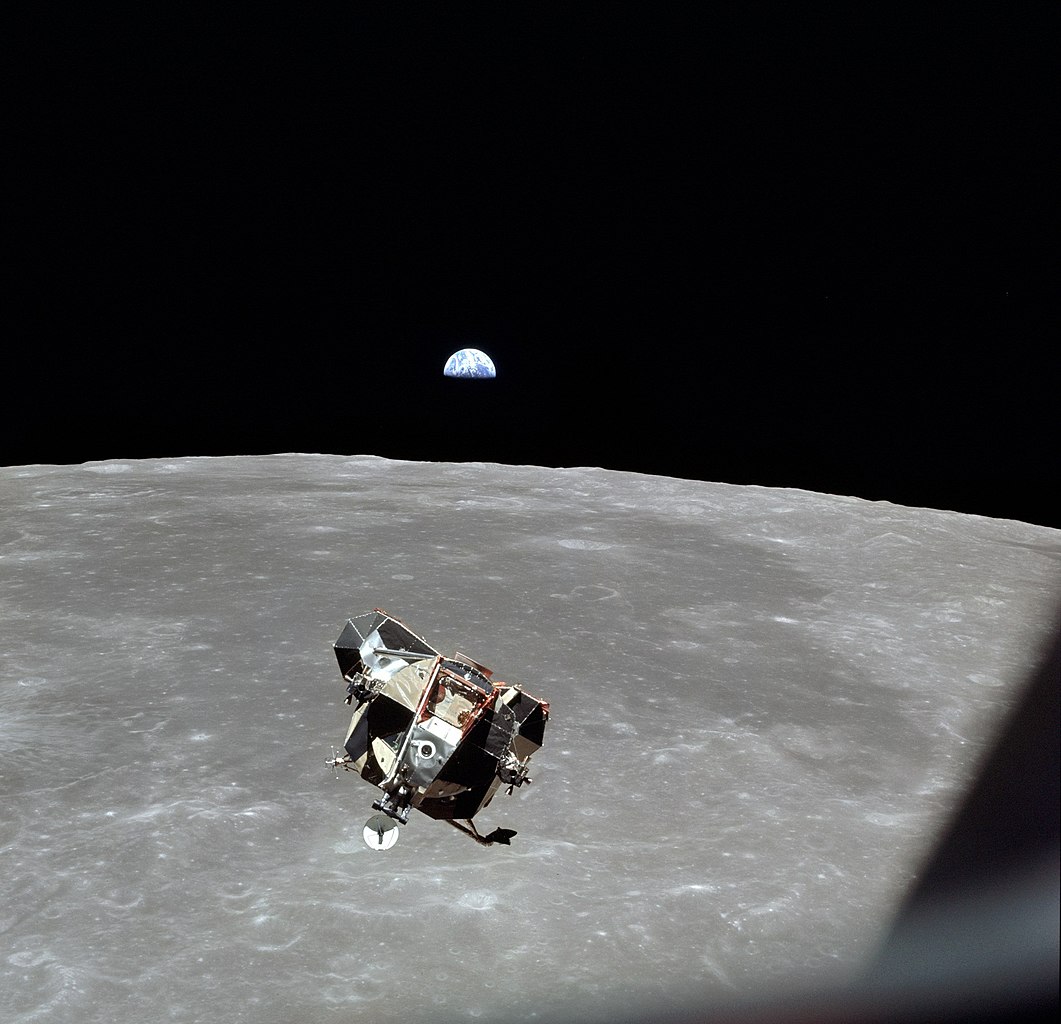
By this point, the most important thing was just to get back in one piece. It doesn’t bear thinking how different our experience of Apollo 11 would have been if, a few days after a triumphant moon walk broadcast to the world, all three astronauts had died in re-entry. As it happens, the planned Apollo 11 landing site had a storm brewing, which could only be predicted by a classified spy satellite. So there’s the interesting story of the complex negotiations required to change the landing site.
Once they did change it, splashdown was successful:
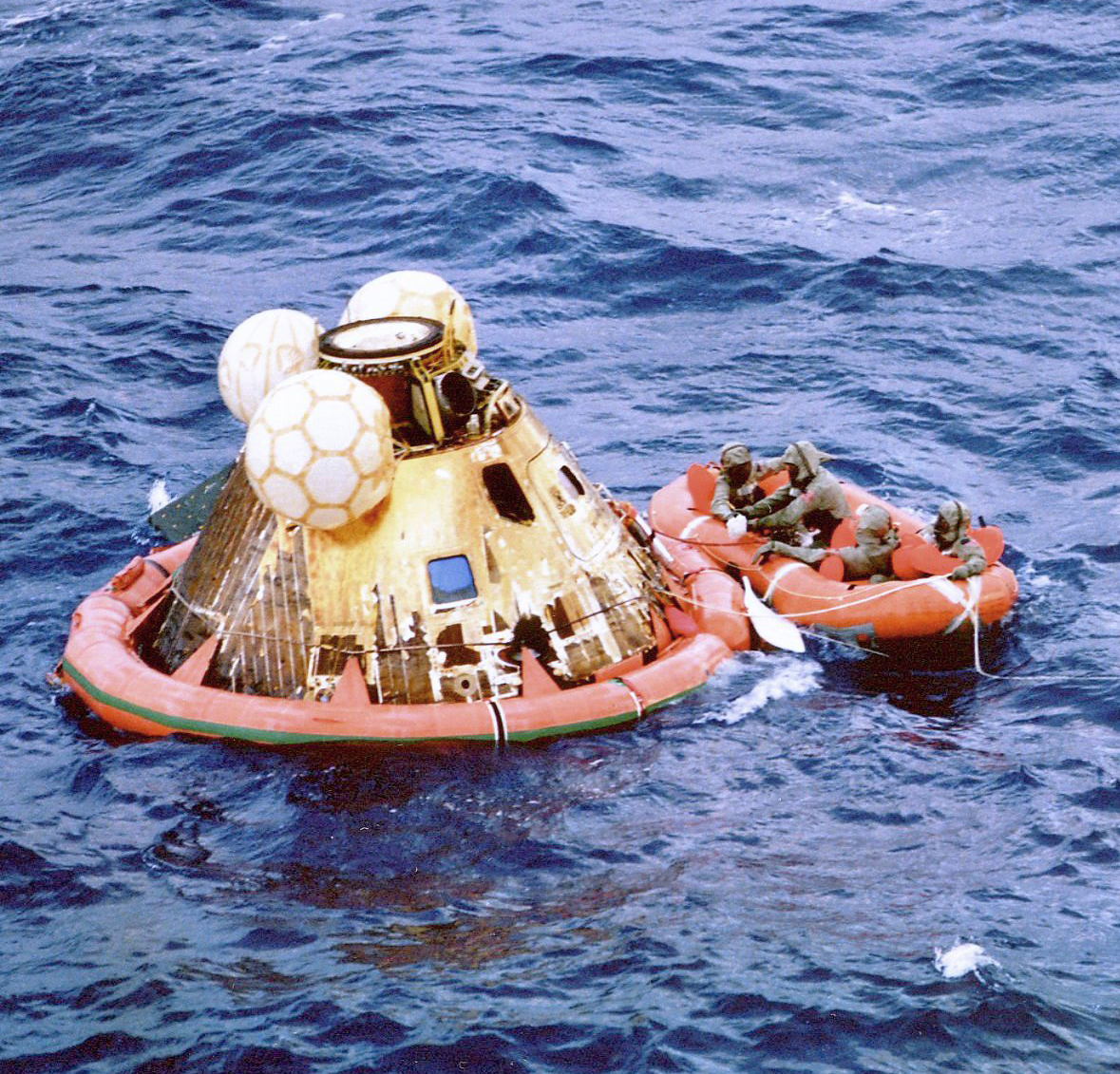
But it wasn’t quite home and dry yet. The astronauts were to be kept in isolation for three weeks, to try and prevent risks of moon diseases.
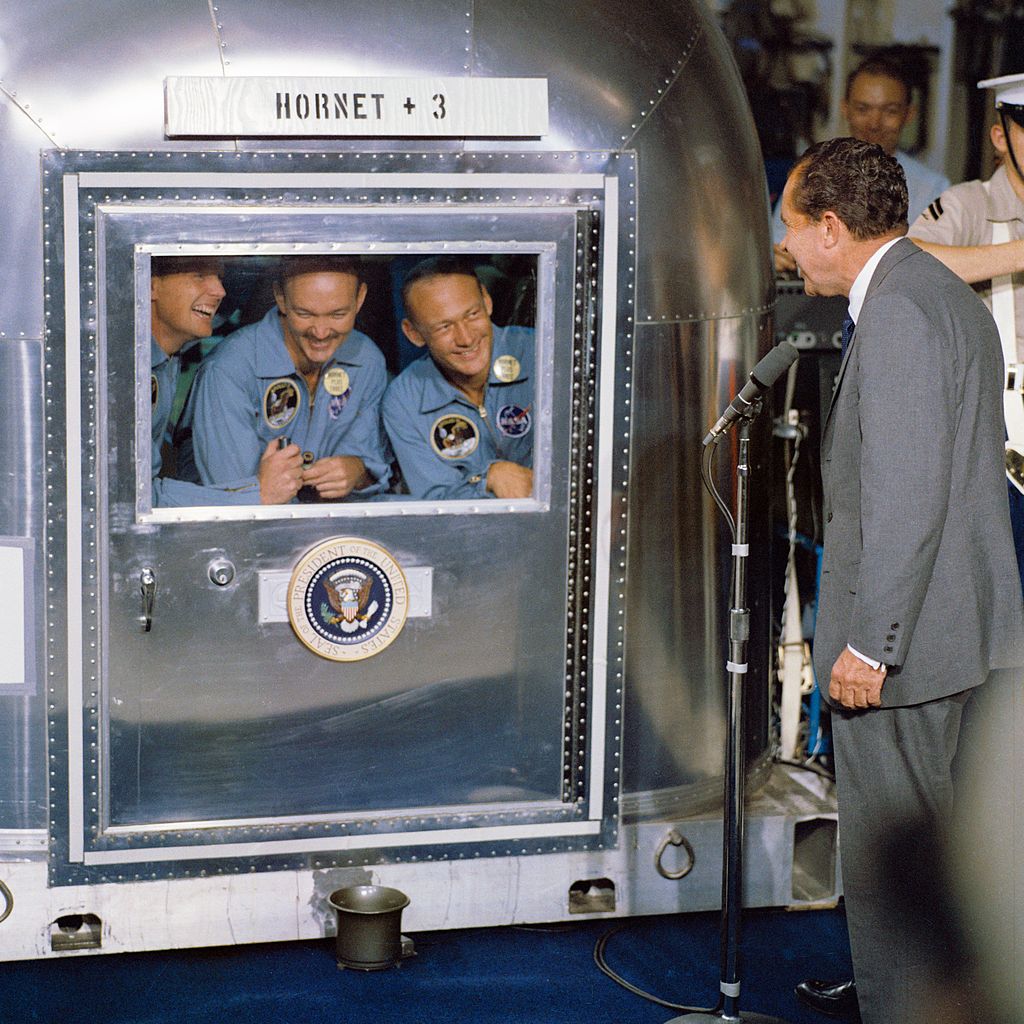
Celebrations
The astronauts were newly minted heroes. Once the isolation period had completed, everyone wanted a piece of them. On 13 August, they had parades in three different cities: New York, Chicago, and Los Angeles.
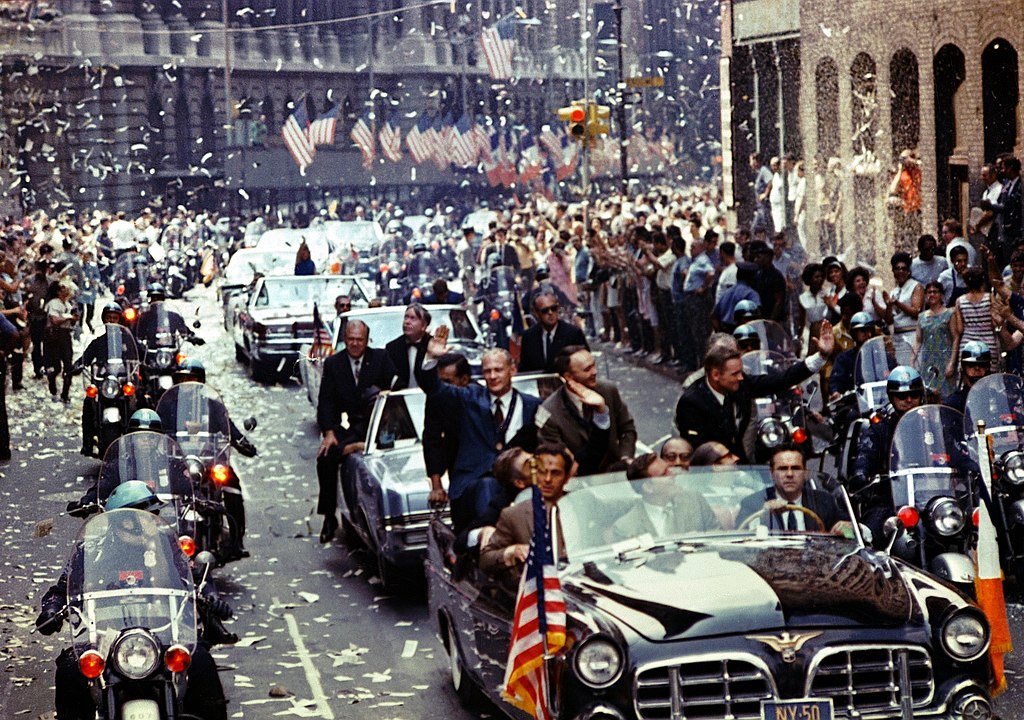
Buzz in particular was filled with a feeling of patriotism. Neil recognised the sentiment in a sign saying “Through you, we touched the Moon.” It was truly a national achievement, but the three astronauts were at the centre of it.
It wasn’t all celebrations, though: Many in the US thought that the space program was a waste of many, and some of those made sure the astronauts knew it.
A world tour
The celebrations weren’t just limited to the US. The astronauts were sent on the “Giant Step” goodwill tour. They visited 24 countries over 45 days, carrying on the mission of peace. In Nixon’s words:
As the first men ever to land on the moon you have demonstrated that you are the best possible ambassadors for peace here on earth.
Neil Armstrong later said they were received:
Not just as individuals, but as representatives of the United States … a symbol of a nation firm in its will to share for the benefit of all mankind.
The effect on the astronauts
None of this was what the astronauts had trained or prepared for. They were test pilots and engineers, not heroes and certainly not PR representatives. They received vast quantities of fan mail, and had to deal with it somehow.
They had been doers, and were now speakers. While no-one had officially said that they would never go into space again, none of the three did. They had reached the peak of their profession in their thirties, and now had to figure out what came next (similar to post-Olympic blues). Buzz talked about a life that was measured in decade and half-decade reunions and anniversaries. It would define them for life.
Their fame gave them opportunities, but it also gave them a burden they weren’t necessarily ready for. One defining thing was the question of who was first. To Neil, there wasn’t anything special in it: He and Buzz had both landed on the moon in the same lander at the same time. History disagreed: Neil would always be the First Man, and Buzz wouldn’t be. And that had a profound effect on both their lives.
Much more has been written about this, and there is much more I could write about it, but for now all I want to say is that the Apollo project had a human cost. The program required hard work and dedication, and many were sucked in at great cost to their family lives and their marriages. As the public face of the mission, perhaps that hit the astronauts harder than anyone.
I don’t think that diminishes the greatness of the achievement. Humans walking on the moon was a major accomplishment, and it could only happen because hundreds of thousands of people really, truly believed in the project. But I also don’t think we can ignore those human costs.
A dead end?
I started by talking about Apollo 11 as one of the greatest achievements in the 20th century, and I think it is. But I’ve seen it criticised because it appears to be a dead end. According to the ever-reliable science fiction, Luna City should be here by now, and it’s not. Humans haven’t been to the moon for nearly 50 years.
When it comes to the practical realm, humanity has some other amazing achievements. For example, better healthcare, better food production, and the increase in life expectancies worldwide. The humble jumbo jet and the container ship have done far more to shrink and change our modern world than any moon-shot has.
However, even that’s not quite fair, because the Apollo program and the space program generally drove technology advancements. I’ve already mentioned integrated circuit development, which was a vital step in preparation for our computers, smartphones, embedded devices, etc. Humanity developed better technology because we needed better technology to reach a target that had never been reached before. GPS is another obvious one - how would we know where we were without the satellites powering it?
Conclusion
To me, Buzz Aldrin’s words while returning from the moon ring true:
As we’ve been discussing the events that have taken place in the past two or three days here on board our spacecraft, we’ve come to the conclusion that this has been far more than three men on a voyage to the Moon; more still than the efforts of a government and industry team; more even than the efforts of one nation. We feel that this stands as a symbol of the insatiable curiosity of all mankind to explore the unknown.
Apollo 11 was not a colonist’s mission: It was an explorer’s mission. Fundamentally, it was the first time a human had set foot on any other world. It was an amazing technological achievement which brought the world together as it had never been brought together before.
The release of the film Apollo 11 this year showed that that historic footage can still inspire the world today. Personally, I had tears in my eyes watching some parts of it.
I think the many commemorative events this year confirm that, when the people of the future look back at the highlights of the twentieth century, they will remember Apollo 11.